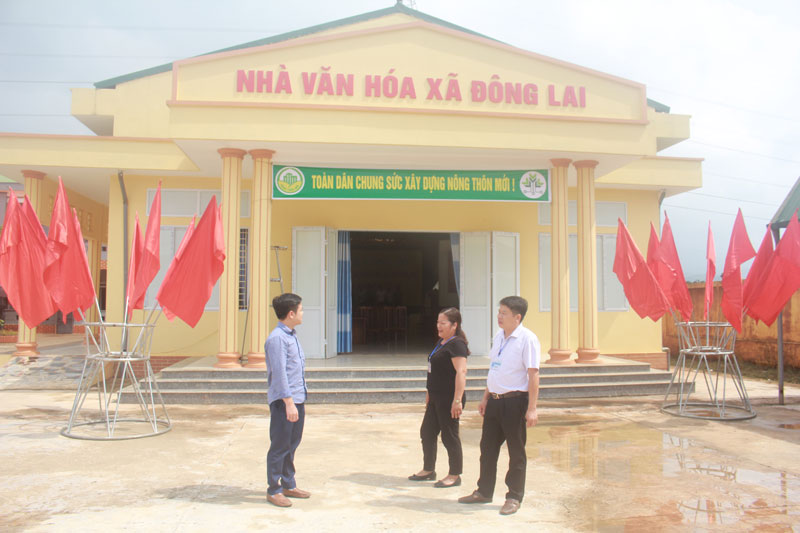
(HBO) – From a poor locality with limited infrastructure, an agriculture-based economy, low per capita income and a high poverty ratio, Dong Lai commune in Hoa Binh’s Tan Lac district has witnessed considerable progress after nine years of implementing the National Target Programme on New-Style Rural Area Building. So far, the commune has completed all 19 criteria of the programme, while living conditions of local residents have significantly improved.
 The Central Culture House of Dong Lai commune has been built to meet
the criteria of a new-style rural area and the demands of local residents and
officials.
The Central Culture House of Dong Lai commune has been built to meet
the criteria of a new-style rural area and the demands of local residents and
officials.
So far, the commune has mobilized
over 51 billion VND (2.19 million USD) for the programme, of which 10.5 billion
VND was contributed by local residents in the form of cash, work, land and
other assets.
Local infrastructure has been
upgraded, while the socio-economic situation in the commune has improved. Currently,
62 percent of inter-field and 55 percent of inter-village roads have been paved,
and all households have access to clean water, while schools in the locality
have been standardized.
A new culture house of the
commune has been built, along with culture houses in every village. Up to 96
percent of locals have joined health insurance.
The improved infrastructure has
created favourable conditions for locals to develop their economic conditions
and reduce the poverty ratio. Many households have switched cultivation strategy
from rice to other crops with higher value.
The commune now has 75 hectares
of lemongrass and more than 200 hectares of citrus trees. The per capita income
among locals has risen to 32.3 million per year from 21 million VND in 2011,
while the poor household ratio has reduced to 11.3 percent.
Bui Van Su, Chairman of the Dong
Lai People’s Committee, said that during the implementation of the programme,
the commune has received donations of 42,400 sq.m of land from more than 1,000
households.
He attributed the result to the
transparent and democratic way the programme has been implemented. Local
residents have become major contributors to the construction of infrastructure
that directly benefit them, he said, stressing the pioneering role of local
officials and Party members./.
The Standing Board of the Hoa Binh provincial Party Committee has agreed in principle on a proposal by the Standing Board of the Party Committee of Hoa Binh city to gather feedback on the city’s 1:2000 zoning plan, which forms part of its broader urban development strategy.
Hoa Binh province has made notable progress in public administration reform and digital government development, with the satisfaction index among citizens and businesses reaching over 84%, according to recent government evaluations.
Thanks to great efforts by local authorities in recent times, the governance and public administration performance of Mai Chau district has been significantly improved.
In the afternoon of June 6, the Party Committee, the People's Council, the People's Committee and the Fatherland Front of Lac Son district solemnly held a meeting to celebrate the 139th anniversary of the district's founding (1886–2025) and the 79th anniversary of the establishment of the district's Party Committee (1946–2025). There was the attendance of Mr. Bui Van Thang, the Vice Chairman of the Provincial People's Council; Mr. Quach Tat Liem, the Vice Chairman of the Provincial People's Committee; Ms. Dang Bich Ngoc, the Deputy Head of the National Assembly Delegation of the province; as well as the former leaders of the province and district through various periods, who are the natives of the district.
Implementing the Politburo’s Resolution No. 57-NQ/TW on breakthroughs in science – technology, innovation, and digital transformation is a golden opportunity for the northern mountainous province of Hoa Binh to renew growth model, improve competitive edge and shorten digital gap.
Resolution 57-NQ/TW, issued by the Politburo on December 22, 2024, identifies sci-tech, innovation, and digital transformation as strategic breakthroughs to build a developed and prosperous nation. In Hoa Binh province, this spirit is not just a slogan, it’s being put into action through concrete initiatives that form a "new development triangle”: digital citizenship, digital economy, and digital administration.



 The Central Culture House of Dong Lai commune has been built to meet
the criteria of a new-style rural area and the demands of local residents and
officials.
The Central Culture House of Dong Lai commune has been built to meet
the criteria of a new-style rural area and the demands of local residents and
officials.